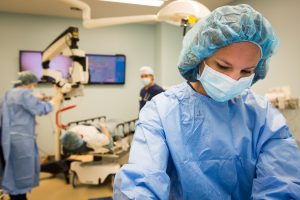In addition to academic knowledge, becoming a successful healthcare practitioner requires solid skill sets that cover theory and practice. Due to changes in the healthcare industry, professionals must adapt to new technologies, challenges, and patient needs.
Aspiring practitioners must master the essential technical expertise and develop problem-solving abilities. Whether you’re a student or a graduate trying to discover the required skills to help you thrive, read on to learn everything you need.

Understanding the Evolving Healthcare Provision Industry
The healthcare industry has continued to evolve due to technological advancements, changing patient demographics, and increasing focus on personalized care. Modern tools are transforming healthcare delivery, making services more efficient, accurate, and accessible.
At the same time, the industry is recording a greater occurrence of chronic diseases, which is calling for a more holistic approach to healthcare provision. Aspiring practitioners must keep up with these changes if they’re targeting success in this field.
To keep up with the future of healthcare, you must stay updated on the latest tools and trends that help practitioners improve patient outcomes. Keeping up with emerging technologies helps professionals achieve faster and more precise diagnostics and treatments.
Adapting to the evolving healthcare industry also shows that practitioners are committed to learning and improving. These qualities are important for success in this dynamic environment.
Important Soft Skills for Aspiring Healthcare Practitioners
Soft skills are personal and intrinsic attributes that help you work effectively with others. These skills are necessary in healthcare, as practitioners work directly with patients to improve their well-being. Here are the personal skills aspiring practitioners must have.
1. Effective Communication Skills
For aspiring healthcare practitioners, effective communication skills ensure clear and compassionate interactions with patients. Healthcare providers must convey medical information in a way that their patients understand.
They must also listen to their symptoms and concerns. Besides patients, communication skills are necessary for collaborating with colleagues and building solid personal relationships. This skill is crucial whether you’re an aspiring lab technician, nurse, or doctor.
2. Attention to Detail
Aspiring healthcare professionals must be able to pay attention to detail as it affects care quality and patient safety. These practitioners are often required to observe symptoms, follow treatment plans, and administer medication accurately. Even the smallest mistakes can attract significant consequences. Detail-oriented people can offer precise, effective, and safe care.
3. Empathy and Compassion
Healthcare professionals can relate to patients more deeply by being empathetic and compassionate. These experts can also understand and share their patients’ feelings, supporting them in difficult times.
By practicing compassion and empathy, healthcare practitioners can create a more comfortable and trusting environment for patients. They’ll also improve patient satisfaction and their overall experience.
4. Team Work
Modern healthcare depends significantly on collaboration. Aspiring healthcare professionals must be able to work together effectively to provide good care to patients. Through good teamwork, practitioners can respect each other, communicate clearly, and coordinate efforts for good results. This way, they can also thrive in the healthcare industry.
5. Time Management
Since time management directly affects patient care and workplace efficiency, it is important for aspiring healthcare professionals. Medical environments are usually fast-paced, with tight deadlines and multiple patients to tend to. Effective time management allows practitioners to stay organized, deal with stress, and prevent burnout.
The Technical Skills Needed by Aspiring Healthcare Practitioners
Healthcare practitioners typically learn the necessary technical skills in school through training or hands-on experience. While different healthcare professions require different skill sets, some are common among all experts. Here are the technical attributes required across most healthcare roles.
1. Clinical Skills
Aspiring healthcare professionals must learn the needed clinical skills that cover a wide range of procedures for looking after patients. These include conducting physical examinations, taking vital signs, and performing tests. Mastery of clinical skills means that healthcare practitioners can assess and respond to client needs, delivering high-quality care and improving outcomes.
2. Technological Proficiency
As modern healthcare continues to rely on advanced tools and systems, technological ability is important for aspiring professionals. They must be able to use devices like handheld ultrasound systems and the required medical software to improve accuracy and efficiency. This knowledge allows medical experts to offer effective care while avoiding human error.
3. Patient Care
Aspiring healthcare professionals must be able to evaluate, diagnose, and treat patients properly. Patient care generally requires a proper mastery of clinical procedures, critical thinking, and effective communication. Continuous learning is important as you must stay updated on evolving medical practices and promote patient well-being.
4. Health Data Management
Health data management involves collecting, organizing, and handling patient information. This skill is important for aspiring practitioners as they must know how to use electronic health records to store patient diagnoses, treatments, and outcomes. Data management also involves properly understanding privacy regulations and patient confidentiality.
5. Emergency Response Techniques
Aspiring healthcare practitioners can act swiftly in emergencies by learning the needed emergency techniques. These techniques include performing CPR, managing airway obstructions, stabilizing trauma patients, and controlling bleeding. Emergency simulation training can help train aspiring medical professionals, making them ready and confident.
Endnote
An aspiring healthcare practitioner must learn several important skills to increase their chances of succeeding in the industry. They must perfect soft skills like effective communication, detail orientation, empathy, compassion, teamwork, and time management. They must also learn technical skills, such as clinical mastery, technological proficiency, patient care, health data management, and emergency response.


